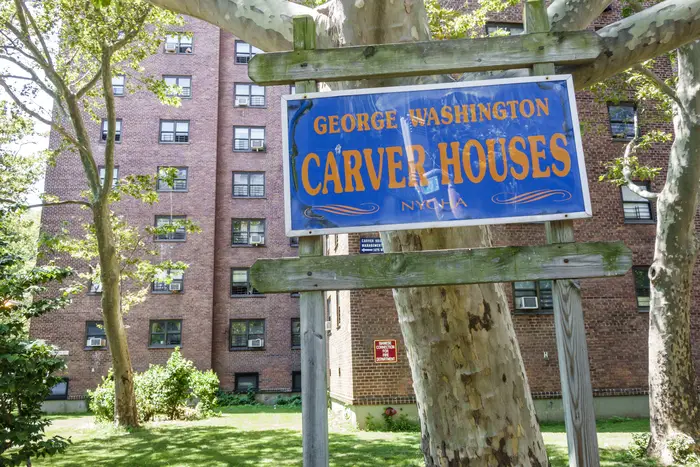Lifestyle
NYCHA Prioritizes Domestic Violence Transfers Amid Long Waits

New York City’s public housing authority has revised its transfer policies to prioritize tenants escaping domestic violence. This significant change aims to address long wait times that previously affected those seeking safer housing. Advocates, however, argue that further measures are necessary to ensure adequate support for these vulnerable individuals.
New Policy Shift for Domestic Violence Survivors
As of March 2024, the New York City Housing Authority (NYCHA) will classify domestic violence-related transfers as “emergency transfers.” This designation grants survivors the same priority as tenants who require accommodations due to disabilities or specific medical needs. This update follows an analysis by Legal Services NYC, which revealed that tenants fleeing abuse were waiting an average of 800 days for relocation, even after their applications were approved.
According to the report, approximately 2,000 households were on the waiting list for transfers due to domestic violence as of fall 2024. The previous system ranked these requests lower than transfers requested by tenants facing long commutes or conflicts with neighbors. Under the new policy, emergency transfers will receive expedited processing, aligning them more closely with other urgent housing needs.
Advocates Call for Enhanced Support
Although the policy change is viewed as a positive step, Luis Henriquez, the director of litigation at Manhattan Legal Services, expressed that the new rules do not fully comply with federal guidelines. He emphasized that tenants fleeing domestic violence should be afforded the same urgency as those displaced due to unsafe living conditions.
“Emergency transfers need to have that exact same level of priority as that apartment that caught fire,” said Henriquez.
The newly approved guidelines still require emergency transfers to wait behind tenants returning to their original apartments or those relocating due to renovations. This arrangement has raised concerns among advocates who argue that it undermines the urgency of domestic violence situations.
Legal Services NYC has also urged NYCHA to appoint a dedicated coordinator to assist survivors and to streamline the process for obtaining Section 8 vouchers. Despite these requests, there has been little indication that the housing authority plans to implement these recommendations.
Addressing NYCHA’s Vacancy Rates
Advocates highlight the need for better utilization of NYCHA’s vacant housing stock. The most recent Mayor’s Management Report indicated that there were 6,451 vacant units in the last fiscal year, marking an increase of nearly 900 from the previous year. This figure does not account for an additional 1,800 units that are being converted from public housing to Section 8-style programs for repairs.
As discussions continue around the new transfer policies and vacancy rates, NYCHA has not yet responded to inquiries regarding its decision-making processes or the current status of its vacant units. The authority’s ability to effectively address housing needs for those escaping domestic violence remains under scrutiny as advocates call for a more comprehensive approach to support these individuals.
-

 Science1 month ago
Science1 month agoIROS 2025 to Showcase Cutting-Edge Robotics Innovations in China
-

 Science2 weeks ago
Science2 weeks agoUniversity of Hawaiʻi at Mānoa Joins $25.6M AI Initiative for Disaster Monitoring
-

 Lifestyle1 month ago
Lifestyle1 month agoStone Island’s Logo Worn by Extremists Sparks Brand Dilemma
-

 Health1 month ago
Health1 month agoStartup Liberate Bio Secures $31 Million for Next-Gen Therapies
-

 World1 month ago
World1 month agoBravo Company Veterans Honored with Bronze Medals After 56 Years
-

 Lifestyle1 month ago
Lifestyle1 month agoMary Morgan Jackson Crowned Little Miss National Peanut Festival 2025
-

 Politics1 month ago
Politics1 month agoJudge Considers Dismissal of Chelsea Housing Case Citing AI Flaws
-

 Health1 month ago
Health1 month agoTop Hyaluronic Acid Serums for Radiant Skin in 2025
-

 Science1 month ago
Science1 month agoArizona State University Transforms Programming Education Approach
-

 Sports1 month ago
Sports1 month agoYamamoto’s Mastery Leads Dodgers to 5-1 Victory in NLCS Game 2
-

 Top Stories1 month ago
Top Stories1 month agoIndonesia Suspends 27,000 Bank Accounts in Online Gambling Crackdown
-

 Sports1 month ago
Sports1 month agoMel Kiper Jr. Reveals Top 25 Prospects for 2026 NFL Draft









